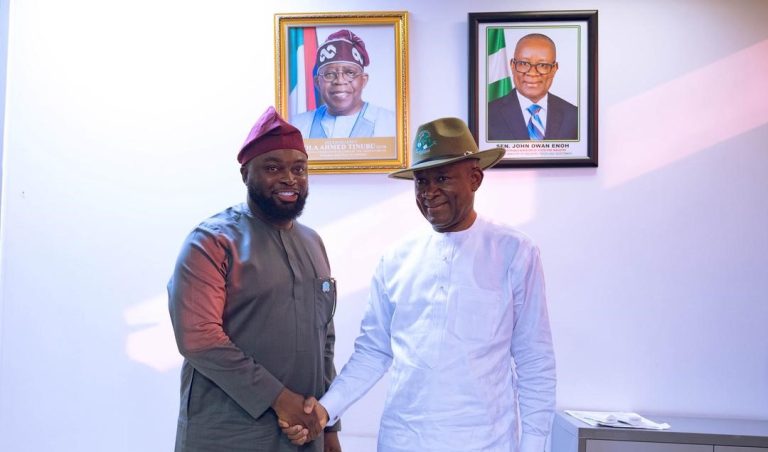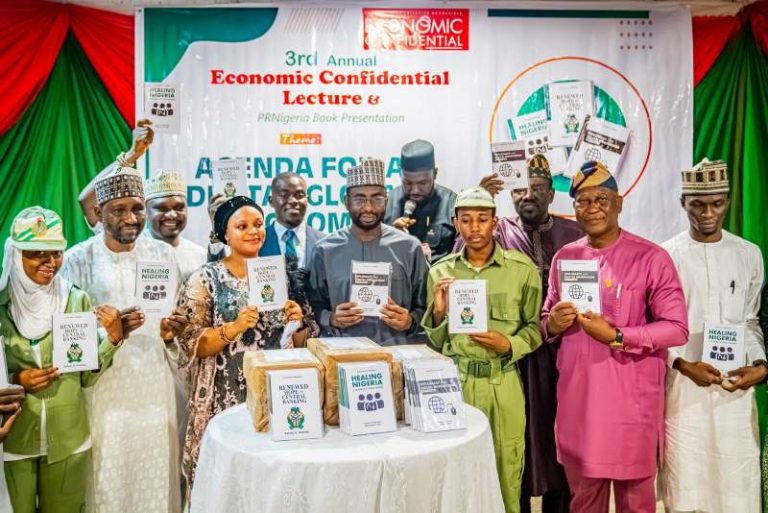…AS 4TH QUARTER COURSE GRADUATES FROM NASPRI
By Okosun Dennis
A Professor of the Faculty of Mass Communication, University of Lagos, Abigail Ogwezzy-Ndisika, has said that both the military and the media have huge roles to play in tackling the spate of insecurity in the country.
Similarly, she explained that guaranteeing National Security was an enormous task that require the cooperation of both the military, media and the entire citizenry noting that we have no other country than ours.
She said this while delivering a lecture entitled: “The Media and the Military Constitutional Mandate (Civil Responsibility) Responsibilities to National Security,” as part of the closing ceremony of the 2021 Media Workshop organised by the Nigerian Army School of Public Relations and Information (NASPRI), Bonny Cantonment held at the 81 Division, Officers’ Mess, Marina, Lagos on Wednesday.
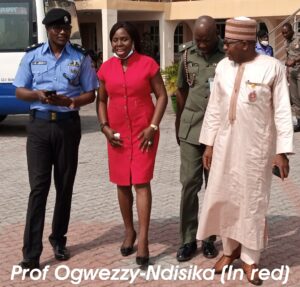 In her summation, “Tackling insecurities is a collective responsibility. If you leave the task to the security forces alone, we would all be in problem hence the media must be involved. National Security will help us to have a peaceful, equitable society.”
In her summation, “Tackling insecurities is a collective responsibility. If you leave the task to the security forces alone, we would all be in problem hence the media must be involved. National Security will help us to have a peaceful, equitable society.”
While cautioning media practitioners to manage the information follow especially those thrown at the public domain in order not to jeopardize National Security, Prof Ogwezzy-Ndisika noted that the media must recognize the fact that they are not just writers but should be mindful of how they package the information in order not to incite the civilian public against the security agencies.
“Security is everyone’s problem no matter the divide. Therefore, we must have a genuine interest as media practitioners.
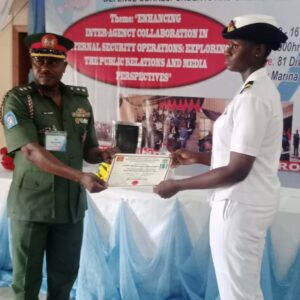 “Don’t heighten tension in your reports as the global community sieve such reports and could use the negative aspects against the country.
“Don’t heighten tension in your reports as the global community sieve such reports and could use the negative aspects against the country.
“The media has a tremendous influence in building a stable society through balanced reportage thereby promoting national cohesion and security,” Prof Ogwezzy-Ndisika reiterated.
In a similar vein, while cautioning the military against the use of powers or force against journalists, noted that a symbolic relationship should exist between them for peace and harmonious existence. “The security agency should learn to work harmoniously with the media to build a stable society.”
On the role the media could play in society, Prof Ogwezzy-Ndisika admonished practitioners to feed the public with information that would bring about meaningful progress and development; and elevate the traditional culture of the people.
Instead of being at loggerheads with each other, she noted, called for media literacy which would see much more of engagements and training, especially on the new media, adding that even though the mainstream media are doing fantastically work, it is not possible to block the air space where the social media operate and are very potent.
As a prescriptive measure, a political solution in resolving conflicts between the military and the media would make it possible whereby there are many social engagements instead of always writing Press Releases and Rejoinders that debunks acclaimed misconstrued facts instead of meeting with the media organization to resolve issues.
On his part, the Commandant, NASPRI, Col Aliyu Yusuf said “We must improve on our engagement on social media and scrutinize the comments made by people rather than glossing over them.”
On the other hand, in his paper entitled: “Strategies of Enhancing Media Military Relations During Internal Security Operations” the former Director, Army Public Relations, Brig-Gen Sani Usman (retd) tasked the public relations officers to be proactive in attending to media enquiries to minimize conflict or information gaps.
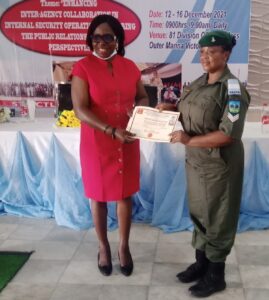 According to him, “Be professional, always answer their calls, text and Whatsapp messages. ‘No Comment’ should never be used to answer journalists during a crisis. In a situation where something happened and it took over 24 hours to give feedback or information on the incident is not good enough and healthy.
According to him, “Be professional, always answer their calls, text and Whatsapp messages. ‘No Comment’ should never be used to answer journalists during a crisis. In a situation where something happened and it took over 24 hours to give feedback or information on the incident is not good enough and healthy.
“Have monitoring and evaluation mechanisms of the social media because much of the problems confronting the media space nowadays are largely from the social media.
While moderating the paper, the Command Information Officer, (CINFO) Western Naval Command, Apapa, Commander Yeibo emphatically stated that the relationship between the media and the military has been laced with tension due to institutional and cultural differences but added that with consistent interactions, a lot can be achieved to cement a much more cordial relationship.
In another development, NASPRI used the opportunity of the workshop to graduate its 2021 Fourth Quarter Course in Photography, Video and Media Officer Operation Course.
In all, officers and men drawn from the Army and Navy consist of 34 soldiers and 10 seamen. In the officer’s category, Army had 16 while the Navy had five officers.
Speaking in his capacity as the Special Guest of Honour, Brig Gen Sani Usman (retd) applauded NASPRI for its quality of officers and men trained since its inception in 2010 which stood at over 4000 across the military and other paramilitary organizations.
“It gladdens my heart that NASPRI has trained so many officers and soldiers and have remained determined in training Public Relations Officers to meet contemporary security and PR challenges. Such men have bridged the Gap at both tactical and operational levels,” Brig-Gen Usman (retd) reiterated.
Awards were given to deserving officers and soldiers who stood out during the three months course. Present at both ceremonies were Major Shirts, former DAPR officer, Mr Marce Ayanywu, a consultant to NASPRI.
Participants at the three-day Media Workshop included officers of the Federal Fire Service, Nigerian Immigration Service, Nigeria Security and Civil Defence Corps, Economic and Financial Commission (EFCC), Federal Road Safety Corps (FRSC), Nigerian Police civilians and the academia.
https://any.peopleandpowermag.com/tackling-insecurity-is-a-collective-responsibility-prof-ogwezzy-ndisika/


